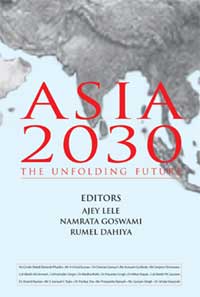Economic Revival: The current economic situation within the country looks grim. High dependence on foreign aid, a burgeoning fiscal deficit, sluggish economic activity and increased military spending seem to be exacerbating the economic distress. The social indices seem to be under severe stress with education and health being the prime areas of concern. Unemployment is rising, inflation is soaring, and lower agricultural production is creating food shortages – the fall out of which is being seen at several levels. The mushrooming of local madrassas as a consequence of poor social indices in Pakistan is a fact well known. How will these economic imbalances be corrected and can the economy simply sustain itself on foreign aid. Is radicalism impinging upon the country’s economic health and would an equitable management of resources lead to a favourable business environment are questions that need to be addressed.
| Editor’s Pick |
Relations with Neighbours: India, Iran and Afghanistan make up the immediate neighbourhood. And the antagonism between neighbours seems to have been cast in stone. The long standing dispute in the state of Jammu and Kashmir, the deep sectarian animosity with Shiite Iran, and the search for strategic depth in Afghanistan show hardly any signs of improvement or reconciliation. The caustic relationship with India surfaces every now and then and, in fact has adversely affected its ability to concentrate on the counterinsurgency campaign in the frontier provinces. Its inimitable obsession of strategic competition with India for influence in Afghanistan affects the probability of improved relations in the neighbourhood. How does Pakistan reconcile its differences with its neighbours will be an important driver for lasting peace in the region.
The caustic relationship with India surfaces every now and then and, in fact has adversely affected its ability to concentrate on the counterinsurgency campaign in the frontier provinces
Extra-regional Interests: Global strategic focus is gradually shifting from Afghanistan to Pakistan. Leading nations of the world are worried about the evolving internal security situation in the country. United States and China, its key allies are earnestly looking to contain the situation lest it implodes and affects their geo-strategic interests. Pakistan is crucial to the United States, for securing its energy interests in the Middle East. Also Iran’s intransigence and unpredictable behaviour can partly be countervailed by United States’ continued presence and relationship with Pakistan. China too seeks to secure its interests in Pakistan through strategic infrastructure development ventures, military cooperation and commercial investments. Both countries could be expected to play a key role, if the situation deteriorates beyond the control of the state in Pakistan. At yet another level, Saudi Arabia’s interference in the political and religious context could become an area of serious concern. Japan and France too have long term developmental and commercial interests within the country and therefore could be expected to play an important role in times of crisis.
The Key Uncertainties
Some of the aforementioned drivers carry a high element of embedded uncertainty. These factors consequentially can cause the future to be much different from today. The trajectories could even go off course and thus be highly uncertain. Four drivers which would make the most crucial difference are discussed:
 Radicalism: The key issue is to ascertain whether or not religious radicalism is the most dominant threat to Pakistani state. Would Pakistan be able to contain the spread of religious fundamentalism within the state? If not, then how far could the political and social landscape of the country worsen? Could it lead to conception of a theocratic state or could it end up in some form of Islamic socialism in Pakistan? Would the state be able to sustain this extremely charged religious environment or do we see the emergence of a revolutionary situation – a la Iran – in Pakistan? The resulting environment shall surely carry severe consequences for countries in the neighbourhood.
Radicalism: The key issue is to ascertain whether or not religious radicalism is the most dominant threat to Pakistani state. Would Pakistan be able to contain the spread of religious fundamentalism within the state? If not, then how far could the political and social landscape of the country worsen? Could it lead to conception of a theocratic state or could it end up in some form of Islamic socialism in Pakistan? Would the state be able to sustain this extremely charged religious environment or do we see the emergence of a revolutionary situation – a la Iran – in Pakistan? The resulting environment shall surely carry severe consequences for countries in the neighbourhood.
Provincialism: Whether or not the growing demand for provincial autonomy is a threat to Pakistan’s unity and cohesion? Can the Pakistani establishment fulfil the compelling aspirations of the individual provinces within constitutional confines of the federal structure? If not, then could it lead to further turbulence and instability within the Pakistani society? Can these fissiparous tendencies over time lead to ‘Balkan-isation’ or ‘Lebanon-isation’ of Pakistani state? The issue is gathering import and could be expected to carry serious consequences in the future. The promulgation of the 18th Constitutional amendment is perhaps an important step towards partial mitigation of the federal differences. It however remains to be seen whether this amendment would produce sound political dividends in the future.
Click to buy: Asia 2030: The Unfolding Future
Democracy and Politics: Whether or not the current political dispensation in Pakistan be able to weather the gathering storms of ‘radicalism’ and ‘provincialism’? Would the political climate deteriorate to hasten the return of military rule? If yes, then when could the Pakistani state swing in favour of the military rule? Would the country witness yet another two to three bouts of civil-military rule before it fully reconciles to merits of a constitutional democracy? However, the continued importance being accorded to the military hierarchy by extra-regional powers does not seem to suggest so. General Ashfaq Kayani’s silent rise and lately the accorded of three year long extension in service and so for pointers in this direction.




